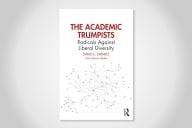You have /5 articles left.
Sign up for a free account or log in.
CHICAGO -- If you are reading a research paper, and scan the authors (in some disciplines, an increasingly long list), do you know who played a meaningful role in the work?
Probably not, according to research released here Saturday at the annual meeting of the American Sociological Association. It's quite likely you are regularly seeing names among those listed as authors who didn't meet some criteria for scholarly authorship. And it's even more likely that there are people -- uncredited graduate students and technicians, but also professors -- who for various reasons are not named.
Research by John P. Walsh, a professor of public policy at Georgia Institute of Technology, and Sahra Jabbehdari, who recently completed a master's degree there, found that 33 percent of scholarly papers in the biological, physical or social sciences had at least one "guest" author, or someone whose contribution did not meet some definitions for co-authorship. And 55 percent of papers had at least one "ghost" author, someone who made significant contributions but was not named.
Walsh and Jabbehdari's findings are based on a survey of the lead authors of scholarly papers -- with 2,300 authors responding. (Lead authors were identified because they were listed as the contact person, or, where no contact was provided, because they were the first authors listed in disciplines that follow that convention for lead authors or the last authors listed in disciplines using that convention.) The papers covered a range of disciplines, a range of numbers of authors, and a range of highly cited and not cited at all.
The new paper's authors found not only significant use of guests and ghosts, but wide variation by disciplines.
Walsh, who presented the results here, said the findings are important not only for one reading a paper and wanting to place the authors.
"We are in an era of high-stakes evaluation," he said, in which professors are evaluated all the time on number of papers written, citations of those papers and so forth. Likewise departments are rated as productive (or not) based on such data. "We know authorship is important," he said. "But how do we assign credit?"
One of the key issues is that disciplines have varying standards. Generally, he said, physics is more inclusive in its authorship than is biology.
The International Committee of Medical Journal Editors, for example, has standards that authorship should be based on all of the following: "substantial contributions to the conception and design" of a research project, a key role in "drafting the article or revising it," and a role in final approval. Merely getting funding or gathering data are not sufficient, the standards say.
Yet the new research shows that 37 percent of medical papers had a guest author, with about two-thirds of those being authorships granted simply for providing data.
The issues may be more serious for ghost authors. In recent years, biomedical and other researchers have received scrutiny over conflicts of interests of authors who receive support from businesses with a stake in the outcome of various studies. Walsh said the current system of widespread ghost authors makes it more difficult to know if anyone in a study might have a conflict of interest. He said he believes that the primary reason for ghost authors is that primary authors don't believe in sharing credit with, among others, grad students and postdocs. But he said there is risk on the conflict of interest issue.
For graduate students in particular, being relegated to ghost status can hurt their chances of building up a record on which to be hired and promoted. Walsh said he believes that there are some generational changes taking place, with today's professors more likely than were those of previous generations to share credit with graduate students and others. But professors in some disciplines, particularly engineering, remain less likely to share credit with graduate students.
Some professors, he said, continue to have an attitude about their graduate students' work that "what's yours is mine and what's mine is mine."
As a result, any comparison of departments may understate some departments' use of graduate students in publications, he said.
As for his paper, Walsh said it had no guests, but some ghosts -- graduate students who helped with data collection. Walsh said that when the work is submitted for publication, the grad students will be identified, so they will not be ghosts.
Papers With 'Ghost' Authors, by Discipline
| Discipline | % of Papers With Grad Student Ghost | % of Papers With Any Ghost |
| Agriculture | 28% | 67% |
| Biology | 15% | 56% |
| Computer science/ math | 30% | 40% |
| Chemistry | 23% | 45% |
| Engineering | 50% | 68% |
| Environmental science | 30% | 66% |
| Materials | 29% | 50% |
| Medicine | 16% | 55% |
| Physics | 17% | 42% |
| Social Sciences | 30% | 52% |
| All | 22% | 55% |







